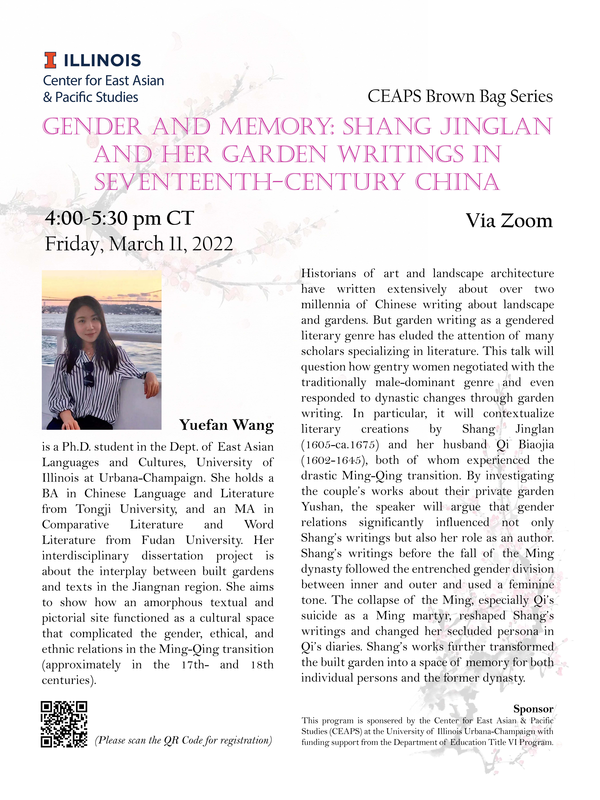
CEAPS Brown Bag | Yuefan Wang, "Gender and Memory: Shang Jinglan and Her Garden Writings in Seventeenth-Century China"
- Event Type
- Seminar/Symposium
- Sponsor
- CEAPS
- Date
- Mar 11, 2022 4:00 - 5:30 pm
- Speaker
- Yuefan Wang
- Registration
- Registration
- Contact
- Yuchia Chang
- yuchia@illinois.edu
- Views
- 219
- Originating Calendar
- CEAPS Events Calendar
Historians of art and landscape architecture have written extensively about over two millennia of Chinese writing about landscape and gardens. But garden writing as a gendered literary genre has eluded the attention of many scholars specializing in literature. This talk will question how gentry women negotiated with the traditionally male-dominant genre and even responded to dynastic changes through garden writing. In particular, it will contextualize literary creations by Shang Jinglan商景蘭 (1605-ca.1675) and her husband Qi Biaojia祁彪佳 (1602-1645), both of whom experienced the drastic Ming-Qing transition. By investigating the couple’s works about their private garden Yushan, the speaker will argue that gender relations significantly influenced not only Shang’s writings but also her role as an author. Shang’s writings before the fall of the Ming dynasty followed the entrenched gender division between inner and outer and used a feminine tone. The collapse of the Ming, especially Qi’s suicide as a Ming martyr, reshaped Shang’s writings and changed her secluded persona in Qi’s diaries. Shang’s works further transformed the built garden into a space of memory for both individual persons and the former dynasty.
Yuefan Wang is a Ph.D. student in the Dept. of East Asian Languages and Cultures, University of Illinois at Urbana-Champaign. She holds a BA in Chinese Language and Literature from Tongji University, and an MA in Comparative Literature and Word Literature from Fudan University. Her interdisciplinary dissertation project is about the interplay between built gardens and texts in the Jiangnan region. She aims to show how an amorphous textual and pictorial site functioned as a cultural space that complicated the gender, ethical, and ethnic relations in the Ming-Qing transition (approximately in the 17th- and 18th centuries).